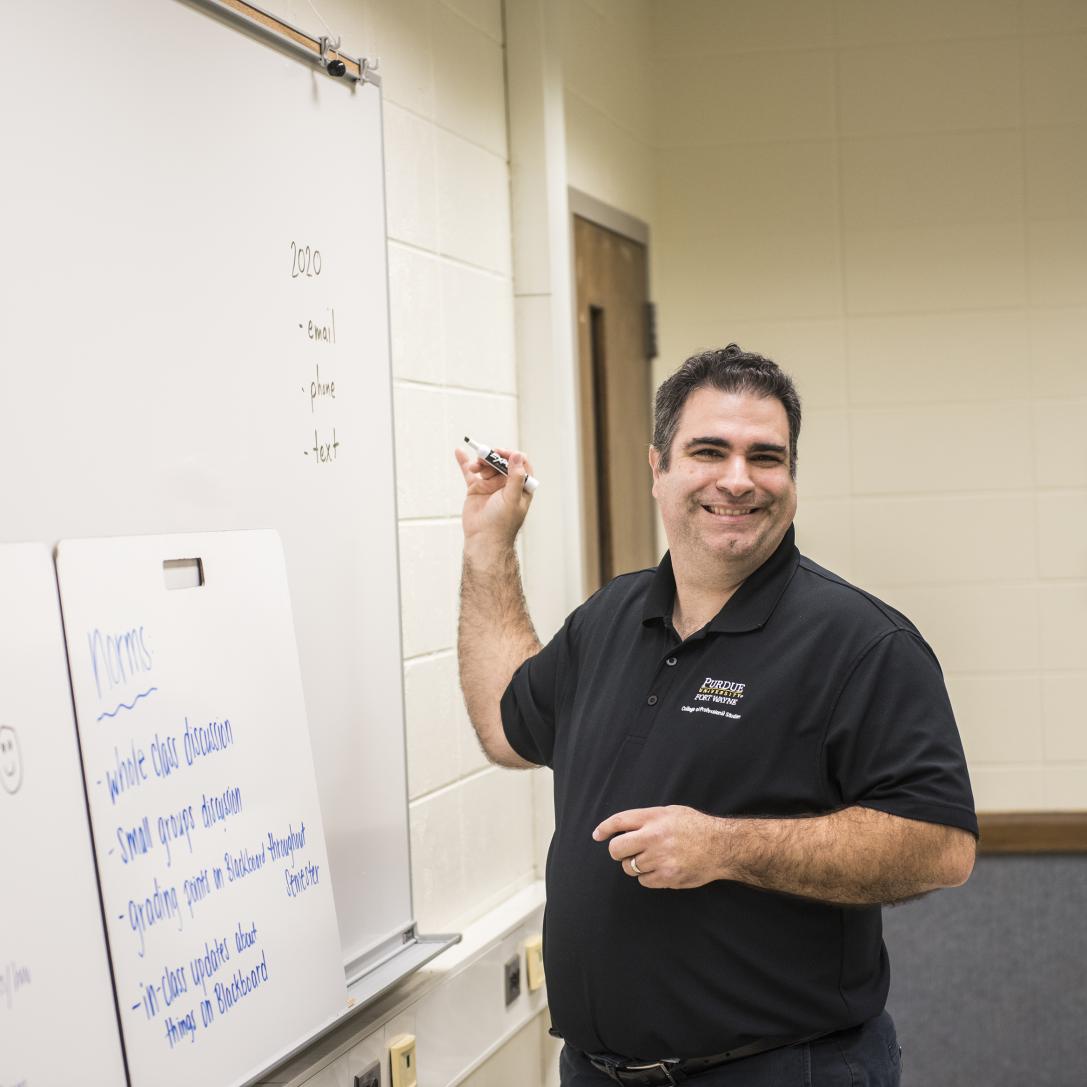
Info for Faculty and Staff
Center for Student COunseling
How to help.
Distressed students often have not sought counseling and may be unaware of the services available to them. Your role could be crucial in identifying and assisting students who are in distress so that you can refer them to the resources available to help them.



When to Refer
How will I know if a student needs help?
The following signs may indicate a need to refer a student to counseling services:
- Abrupt changes in behavior, including a dramatic decrease in academic functioning
- Increased isolation from others
- Noticeable changes in mood, such as depression, apathy, or irritability
- Poor attendance in class
- Sudden outbursts of anger
- Alcohol/drug misuse
- Marked change in personal hygiene/appearance
- Inappropriate crying
- Suicidal statement (follow guidelines for crisis response)
Guidelines and Strategies
What protocol should I follow?
Students may notify you that they are in distress in a variety of ways- they may talk to you, write to you, mention something concerning in a paper or creative project, or you simply may observe some things that concern you. Please remember- if you think a student is an immediate, life-threatening danger to themselves or others, don't hesitate to call 911. Otherwise, the following steps are advised:
- Remember that it is always better to ACT. If you are very concerned for a student, don't wait- connect with someone who can help. You can always call the Center for Student Counseling, the Office of Conduct and Care, University Police, or the Timely Care consultation line for faculty and staff (833-484-6359) if you are concerned about a student and not sure what to do.
- Talk to the student.
- Listen carefully, show concern and interest.
- Offer support.
- If you are unsure how serious the situation is, ask the student. It is always better to ask than to wish you had asked later. You can be curious about suicidal thoughts by saying something like "sometimes when things get bad for students or they are really hurting, they think about killing themselves. Is this something you have thought about?" If a student says yes, listen non-judgmentally. Remember, if they are talking to you about it, it is a good thing! They are seeking help. Your job is now to get them to a provider. Never leave someone who is suicidal alone and make sure they are connected to services. If the student is in immediate danger and able to injure themselves or others in the moment, call 911. Otherwise, walk them to the Center for Student Counseling in Kettler during open hours (Monday through Thursday, 9-4pm and Friday 9-noon). If it is after hours, you can call/text 988 (911 for mental health issues) or help the student get logged into the TalkNow function on TimelyCare: Timely Care for PFW Students Timely Care for IU Students . Once a student is connected to a provider, fill out a CARE Form.
- If the student is not in crisis but just has mental health concerns, please refer them to the Center for Student Counseling or Timely Care. Always complete a CARE Form when you notice or talk to any student in distress, even if the student says they are ok.
- If you ever feel unsafe or feel a student is unsafe, call 911 immediately to be connected with Campus Police.


Faculty and Staff Resources
Faculty and Staff Resources
Frequently Asked Questions
Find the answers you need.
Take a look at some of the most frequently asked questions to find the answers you may be looking for. If you have any additional questions, please reach out to us.
Definition of Distress
Behaviors that threaten to harm oneself or others, symptoms of psychosis, or becoming extremely withdrawn or depressed. These are often severe mental-health concerns that often constitute urgent or emergent situations.
Examples of Students in High Distress (follow crisis steps- if there is immediate danger to you, the student, or anyone else, call 911).
- Suicidal or homicidal statements (particularly those that indicate a specific plan and/or access to means)
- Making threats of physical violence
- Delusional thinking
- Experiencing hallucinations or disorientation
- Indications of a drug overdose
- Cutting or other self-injurious behavior
- Stalking
- Reports of sexual assault
- Bringing a firearm or other weapon to class
Other Signs of Distress:
- Noticeable changes in behavior, mood, relationships or hygiene
- Changes in academic performance or class attendance
- Recent loss (death, end of a relationship, financial, academic, pet, etc.)
- Nervousness, agitation, irritability
- Tearfulness
- Reports of helplessness, hopelessness, guilt
- Impulsive or reckless behavior
- Cognition changes or confusion
- Withdrawal and social isolation
- Feelings of apathy, disconnection, or chronic disinterest
- depressive symptoms like frequent crying, sleep changes, appetite changes, or loss of pleasure
- Self-esteem issues or self-loathing
- Confusion or difficulty concentrating
- If the student is in a life-threatening situation or poses a threat to others, call 911 immediately. Stay with the student if it is safe to do so. If there is immediate danger, do not call the center or any other service- this will delay emergency services.
- If the student is in significant distress that is not immediately threatening, stay with the student and connect them with a provider. Call the Center for Student Counseling (260-481-6200) or walk the student to the center (Kettler G02) during open hours (Monday-Thursday 9-4 and Friday 9-noon). If it is after hours, connect the student to TimelyCare Talk Now or call/text 988. Always submit a CARE referral.
The counseling staff at the Center for Student Counseling welcomes your calls at 260-481-6200 during open hours to consult with us regarding your concerns about your students. Counseling staff can offer suggestions and ideas about referral options, resources, and other ways to address your concerns. We are also happy to meet with you to discuss wellness, self-care, stress management, and mental-health training or presentations for your classes or departments.
The Timely Care Faculty Guidance Line is also available for consultation 24/7 at 833-4-TIMELY.
Although it may feel intrusive or uncomfortable to address these personal issues with students, more often than not, students appreciate the effort. Tell the student you would like to speak with them about your concerns and ask the student to meet with you during office hours or some other time. When sharing your concerns, do not attempt to be the therapist, but rather, provide information and referral options regarding campus and community resources. You may even offer to walk the student to the counseling center during operating hours.
Take these simple steps to refer a student to our free and unlimited care at the Center for Student Counseling:
- Provide the student with our phone number (260-481-6200), give them our email ([email protected]) or direct them to our website for further information.
- Consider having the student call from your office.
- Walk the student to the office (Kettler G02, behind Einstien Bros Bagels)
- Fill out a CARE Referral Form.
Refer a Student to free Online Services with Timely Care.
- All enrolled students have access to Timely Care with their PFW or IU Credentials.
- Students have unlimited access to TalkNow services- being connected to a provider for immediate support. This service is available 24 hours a day, 365 days a year.
- PFW Students have 9 scheduled counseling sessions per academic year with a provider of their choice through the Scheduled Counseling Option.
- Students also have unlimited access to wellness and self-care resources and a peer support student community through the TimelyCare app. Timely Care for PFW Students Timely Care for IUFW Students
- Faculty and Staff who wish to discuss the best ways to support students can call the TimelyCare consultation Line at 833-4-Timely at any time.
- Fill out a CARE Referral Form
No. We are unable to allow anyone other than the student to make an appointment for counseling at the center. You can encourage the student to make an appointment.
We do not offer counseling services for faculty and staff at our center. Please see the information on the Employee Assistance Program (EAP). If you are interested in health coaching services, contact Ethan De La Torre at the Center for Healthy Living. Kerrie Fineran and Eric Manor are also available for brief consulting and support in Employee Wellbeing Services (Ketter G07).
SAMPLE SYLLABI STATEMENT FOR FACULTY
Student Mental Health
Your emotional wellness and mental health are important. Taking classes can be stressful. I recognize that you may also have significant responsibilities outside of academia, and that you are often pulled in multiple directions. I encourage you to consider developing realistic self-care activities that you can incorporate into your daily life. If you have a mental health disorder, are struggling with your mental health, your stress overwhelms your ability to cope with it, or you find yourself needing emotional support, please talk to someone. You have many options for support- you are NOT alone.
- If you or someone you know is in immediate life-threatening danger, call 911. Compassionately trained campus police officers will be there to assist you.
- If there is a mental health crisis situation that is not immediately life threatening, call or text 988, call or walk to the Center for Student Counseling, or connect with Timely Care Services immediately.
- All currently enrolled PFW and IUFW students have access to free counseling in-person counseling at the Center for Student Counseling (260-481-6200 or email [email protected]) You may also walk-in during operating hours if you need immediate assistance. The CSC is open 9:00am – 4:00pm Monday through Thursdays and 9:00am – Noon on Fridays. The CSC is located on the ground floor of Kettler Hall at the end of the corridor beyond Einstein Bros. Bagels, room G02. More information about the CSC can be found at www.pfw.edu/CSC. The CSC also has a relaxation area, quiet study space, food pantry, and free coffee and tea bar for all students!
- All currently enrolled PFW and IUFW students also have access to free online counseling through TimelyCare. Unlimited TalkNow sessions are available for all students, 24 hours a day, 365 days a year for support wherever you are, whenever you need it. Download the Timely Care app and login with your PFW (Timelycare.com/pfw) or IUFW (Timelycare.com/iu) credentials. Students also have access to a limited amount of free scheduled counseling with a provider of their choice through the service, as well as access to Self-Care journeys for personal growth and resilience, and a peer support community of college students across the country.